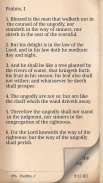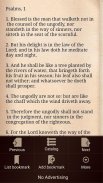




Bible - Psalms

Description de Bible - Psalms
Psalms
The Book of Psalms (Hebrew: תְּהִלִּים or תהילים Tehillim meaning "Praises"), commonly referred to simply as Psalms or "the Psalms", is the first book of the Ketuvim ("Writings"), the third section of the Hebrew Bible. The English title is from the Greek translation, ψαλμοί psalmoi, meaning "instrumental music" and, by extension, "the words accompanying the music." There are 150 psalms in the Jewish and Western Christian tradition (more in the Eastern Christian churches), many of them linked to the name of King David, but his authorship is not accepted by most modern Bible scholars.
Benedictions and superscriptions
The Book of Psalms is divided into five sections, each closing with a doxology (i.e., a benediction) – these divisions were probably introduced by the final editors to imitate the five-fold division of the Torah:
Book 1 (Psalms 1–41)
Book 2 (Psalms 42–72)
Book 3 (Psalms 73–89)
Book 4 (Psalms 90–106)
Book 5 (Psalms 107–150)
Many psalms (116 of the 150) have individual superscriptions (titles), ranging from lengthy comments to a single word. Over a third appear to be musical directions, addressed to the "leader" or "choirmaster," including such statements as "with stringed instruments" and "according to lilies." Others appear to be references to types of musical composition, such as "A psalm" and "Song," or directions regarding the occasion for using the psalm ("On the dedication of the temple," "For the memorial offering," etc.). Some carry the names of individuals, the most common being David, and thirteen of these relate explicitly to incidents in the king's life.
Overview
Individual psalms were originally hymns, to be used on various occasions and at various sacred sites; later, some were anthologised, and might have been understood within the various anthologies (e.g., ps.123 as one of the Psalms of Ascent); finally, individual psalms might be understood within the Psalter as a whole, either narrating the life of David or providing instruction like the Torah. In later Jewish and Christian tradition, the psalms have come to be used as prayers, either individual or communal, as traditional expressions of religious feeling.
Psaumes
Le Livre des Psaumes (hébreu: תְּהִלִּים ou תהילים Tehilim signifie "Louanges"), communément appelée simplement Psaumes ou "Psaumes", est le premier livre de la Ketuvim («Écrits»), la troisième section de la Bible hébraïque. Le titre anglais est de la traduction grecque, psalmoi ψαλμοί, qui signifie «musique instrumentale» et, par extension, "les mots qui accompagne la musique." Il ya 150 psaumes dans la tradition judéo-chrétienne et occidentale (plus dans les églises chrétiennes orientales), beaucoup d'entre eux lié au nom du roi David, mais son auteur ne sont pas acceptés par la plupart des savants modernes de la Bible.
Bénédictions et superscriptions
Le Livre des Psaumes est divisé en cinq sections, chaque fermeture par une doxologie (ie, une bénédiction) - ces divisions ont probablement été introduit par les éditeurs finales à imiter la division par cinq de la Torah:
Livre 1 (Psaumes 1-41)
Livre 2 (Psaumes 42-72)
Livre 3 (Psaumes 73-89)
Livre 4 (Psaumes 90-106)
Livre 5 (Psaumes 107 à 150)
Beaucoup de psaumes (116 des 150) ont superscriptions individuels (titres), allant de longs commentaires pour un seul mot. Plus d'un tiers semble être directions musicales, adressée au "leader" ou "chef de chœur», y compris des déclarations telles que «avec des instruments à cordes" et "selon lis." D'autres semblent être des références à des types de composition musicale, comme «Un psaume" et "Song", ou des directives concernant l'occasion d'utiliser le psaume ("Sur la dédicace du temple", "Pour l'offre mémorial», etc ). Certains portent des noms de personnes, les plus courantes étant David, et treize d'entre eux rapportent explicitement aux incidents de la vie du roi.
Vue d'ensemble
Psaumes individuels étaient à l'origine des hymnes, à être utilisés à plusieurs reprises et à différents sites sacrés; plus tard, certains ont été anthologised, et aurait pu être compris dans les diverses anthologies (par exemple, ps.123 comme l'un des psaumes de Ascent); enfin, psaumes individuels pourraient être comprises dans le Psautier dans son ensemble, soit en racontant la vie de David ou l'apprentissage comme la Torah. Dans la tradition juive et chrétienne plus tard, les psaumes sont venus à être utilisés comme des prières, individuels ou collectifs, comme des expressions traditionnelles du sentiment religieux.


























